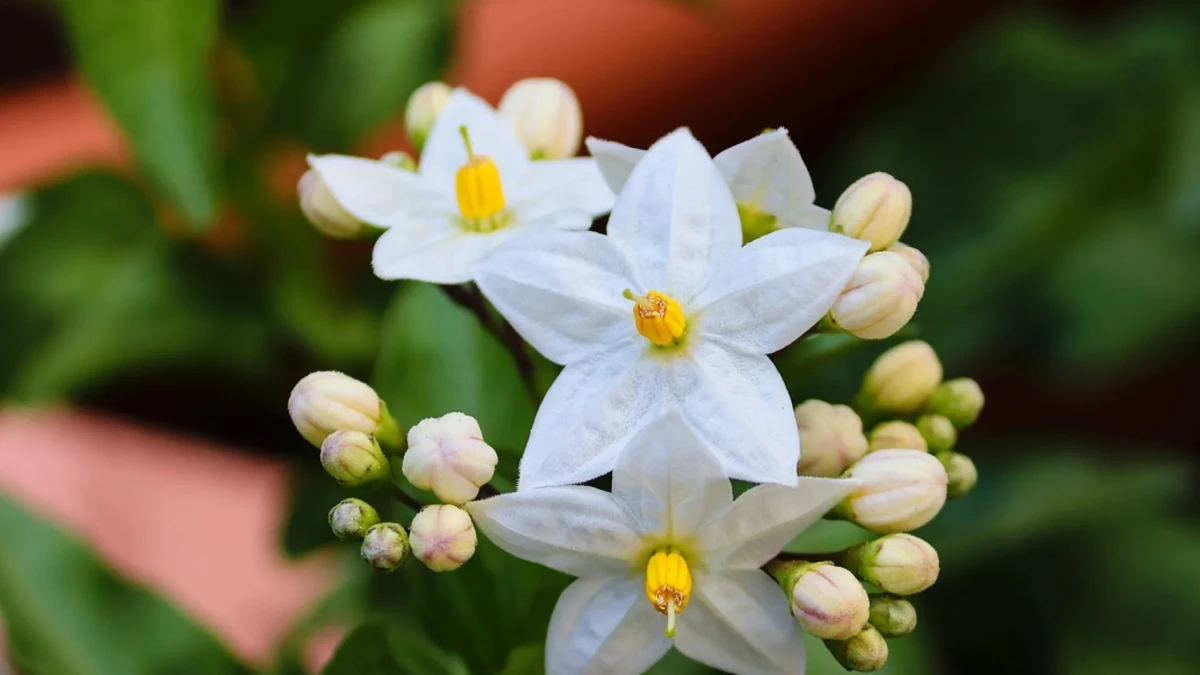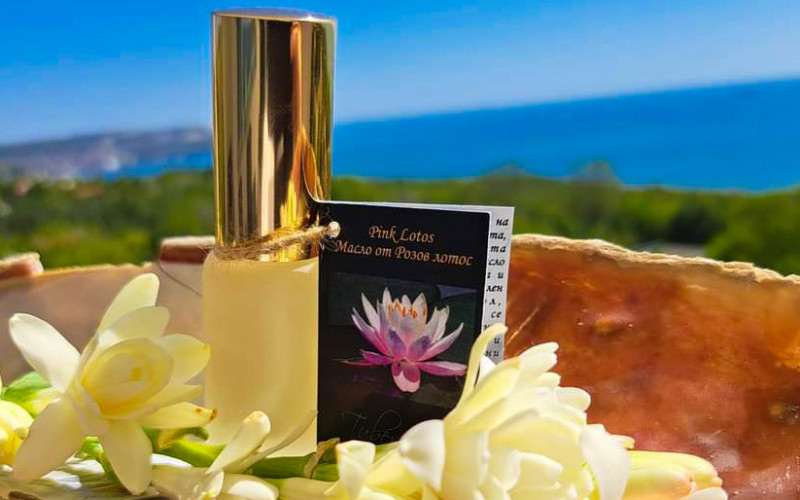Jasmine is known for its irresistible aroma and numerous beneficial properties that make it extremely popular in cosmetics, perfumery, aromatherapy and folk medicine. In this article, we will look at the origins of this amazing plant, as well as its active ingredients, beneficial properties, and uses in various fields.
Origin and meaning of jasmine
The jasmine plant belongs to the olive family (Oleaceae) and includes over 200 species of flowering plants. Its origins can be traced to the tropical and subtropical regions of Asia, Africa and Europe. The best known species used in perfumery and cosmetics are Jasminum grandiflorum and Jasminum sambac, which originate from India and the Arabian Peninsula respectively. The name of this plant is probably derived from the Persian language 'Yasmeen' and means 'Gift of God'.
In flower symbolism, jasmine represents purity, modesty and strength. The plant is known by its many nicknames such as "Moonlight of Love", "Queen of the Night", "Moon Bush", "Mistress of Flowers", due to the fact that its intoxicating fragrance is strongest after sunset and during waning moonlight.
Jasmine is believed to embody a connection to the divine and is considered an extremely sacred plant that has numerous ceremonial uses in various cultures. It is often present in decorations at altars, weddings or other important events and ceremonies, symbolizing a promise of mutual love, strength, simplicity, holiness, humility and purity. In the Philippines, jasmine is accepted as a national symbol and garlands and tiaras of it are considered the most expensive gift with which to welcome desirable guests.
In ancient times, jasmine was believed to be prophetic in nature and hold secrets of wisdom. In magical traditions, jasmine was often burned as incense to stimulate clairvoyant dreams and astral projection.
Interesting facts about the jasmine plant
Why is jasmine so unique?
The jasmine plant is distinguished not only by its beautiful flowers, but also by its extremely strong scent, which is intensified in the evening and at night. This phenomenon is explained by the fact that jasmine is a night-blooming plant that attracts nocturnal pollinators such as moths. Interestingly, the scent of jasmine has often been used in various religious ceremonies and rituals to create calm and spirituality.
Types of jasmine
There are over 200 species of jasmine, but the most common, as mentioned above, are Jasminum officinale (white jasmine) and Jasminum sambac (Arabic jasmine). These species can be found in different parts of the world and are grown for both ornamental and medicinal purposes. Each species has its own unique characteristics, but they all share one thing in common - the wonderful fragrance and delicate flowers that make them ideal for decorating gardens and homes.
Active ingredients of jasmine
Jasmine contains numerous active ingredients that contribute to its healing and cosmetic properties. The main active components include:
1. Essential oils
Jasmine oil contains benzyl acetate, benzyl alcohol, linalool, indole and jasmone, which give jasmine its characteristic aroma and have a variety of therapeutic properties. Some of these are a calming effect on the nervous system and the reduction of anxiety and stress, antiseptic and antibacterial properties, as well as regenerating and stimulating cell synthesis.
2. Flavonoids
These plant compounds possess antioxidant properties that help protect cells from damage. Applied to the skin as an oil or cream, they improve its overall health and slow down the aging process.
3. Alkaloids
Jasmine contains small amounts of alkaloids, which have a calming effect on the nervous system. They also help relieve pain and reduce inflammation.
4. Saponins
These compounds have cleansing and antiseptic properties that make them extremely beneficial for the skin. They successfully remove all impurities and help in treating various skin irritations and infections.
5. Tannins
These compounds have astringent properties that help in enlarged pores and improve skin texture.
Useful properties of jasmine
Jasmine possesses numerous beneficial properties that make it valuable to the human body. For centuries, jasmine essential oil has been used to balance hormones, relieve stress and improve mood. Let's also take a look at some of its main benefits:
Antidepressant
The aroma of jasmine has been proven to have a calming and antidepressant effect. Inhaling jasmine oil can significantly reduce stress and anxiety, improving mood. A study published in the Journal of Health Research looked at the effects of jasmine oil inhalation on the central nervous system and mood. They found that the oil did have a positive effect on mood and brain activity, with participants reporting feeling more positive and energetic than before.
Improving sleep
Conversely, jasmine (consumed as a tea or used in essential oil form) has a sedative and calming effect on the nervous system. The sedative compounds found in this herb have been found to promote restful sleep, help make it easier to fall asleep and significantly reduce midnight awakenings.
A study published in the European Journal of Applied Physiology found that the scent of jasmine alone has a sedative effect on both autonomic nervous activity and mood state. Researchers found that inhaling jasmine (along with lavender) helped improve heart function and reduce heart rate. It also induces feelings of calm and relaxation, which helped participants in a given study fall asleep more easily.
Aphrodisiac
Jasmine has been known as an aphrodisiac and libido enhancer and erectile dysfunction enhancer since ancient herbalists. Its exotic and intoxicating aroma not only lifts the spirit, but also helps to overcome emotional barriers more easily, stimulating feelings of intimacy. It is believed to enhance blood circulation in the sexual organs and stimulate sexual desires. Its antidepressant qualities, combined with its ability to relax the body, make jasmine an excellent remedy for sexual problems that are more mentally based than physically based. In addition, jasmine is believed to help promote feelings of love, confidence, compassion, acceptance and emotional balance.
In the ancient Indian chakra system, sexuality is associated with the sacral chakra, which is located in the pelvic region around the lumbar spine below the navel. The sacral chakra represents not only sexuality but also creativity. According to this tradition, the sacral chakra is the source of creative expression, emotions, etc. Jasmine can help you unlock this particular chakra and feel as comfortable and confident in your body and mind as possible.
Hormonal balance
Jasmine has a positive effect on hormonal balance, especially in women. With its natural hormone balancing properties, it has been shown to improve symptoms of PMS (premenstrual syndrome) and menopause. It regulates the menstrual cycle and provides relief from painful menstruation.
This gentle essential oil can also help relieve postpartum depression due to its antidepressant properties. Women who used jasmine essential oil after childbirth have been shown to have shorter and faster recoveries.
Antiseptic and antibacterial agent
Due to its rich and beneficial composition, jasmine oil has pronounced antiseptic and antibacterial properties that help treat skin infections and wounds.
Improving the activity of the digestive system
Jasmine is rich in antioxidants that interact with gastrointestinal enzymes to facilitate better absorption of nutrients and promote healthy bowel function. It also promotes the growth of good bacteria in the gut and has been found to eliminate harmful bacteria. It also has antispasmodic properties that relieve stomach pain and cramps, improving digestion.
Applied in perfumery and cosmetics
Jasmine is one of the most popular fragrances in perfumery and cosmetics thanks to its intense and seductive scent. It is found in the form of jasmine oil and in some cases as a cream. It has a number of beneficial properties such as moisturizing, nourishing and regenerating. It is particularly useful for dry and sensitive skin.
In aromatherapy, jasmine oil has also found successful use for treating stress, depression and anxiety, and insomnia. Its aroma has a calming effect on the nervous system and helps improve general well-being. It is also often included in massage oils to improve circulation, reduce muscle tension and improve mood.
Growing jasmine: tips and tricks
How to grow jasmine in the garden
Jasmine is a relatively easy plant to grow, which loves full sun and well-drained soil. It can be grown both outdoors and in pots, making it suitable for gardens as well as balconies and patios. Jasmine requires at least six hours of sunlight a day to grow healthy and flower profusely.
Watering and caring for jasmine
The jasmine plant requires moderate watering. It is important to keep the soil moist but not waterlogged, as excessive watering can cause the roots to rot. In winter, watering can be reduced as the jasmine goes dormant.
Regular pruning is also recommended, especially in spring, to stimulate growth and keep the plant compact.
Suitable seasons for jasmine
Jasmine is a heat-loving plant and usually flowers in spring and summer. Some species may continue flowering into autumn, depending on the weather conditions. In regions with mild climates jasmine can grow all year round, but in colder regions it is advisable to grow it in pots so that it can be brought indoors during the winter months.
Jasmine is a plant with a rich origin and numerous beneficial properties that make it valuable in various directions. Its aroma not only enriches perfumery and cosmetics, but also has proven therapeutic effects on human health. From its antidepressant and antibacterial properties, to its use in aromatherapy and cosmetics, jasmine is truly versatile and indispensable. Order from us today and enjoy its amazing benefits on body and mind!



